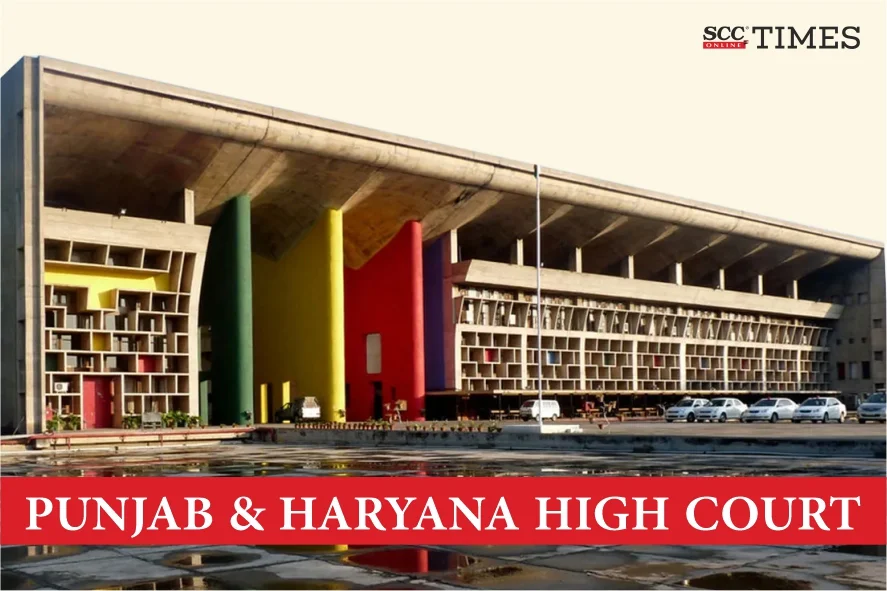Punjab and Haryana High Court: In a writ petition filed against impugned orders whereby the petitioners’ claim for recruitment as Punjab Civil Service (Judicial Branch) Officers was rejected, the Division Bench of Sheel Nagu, CJ., and Sumeet Goel, J., rejected the petition, holding that it was barred by laches.
Background
In 2001, the petitioners applied for the post of Punjab Civil Service (Judicial Branch) Officers as advertised by the Punjab Public Service Commission. They were successful therein and issued their appointment letters.
Subsequently, the Registrar General of the Court, informed the petitioners and other selectees that the recruitment/appointment letters were terminated upon discovery of a recruitment scam. The said cancellation order(s) were unsuccessfully challenged by some of the selectees before the Court, though the petitioners contended that they were not a part of it.
The petitioners and other selectees faced trial with respect to the scam, and in 2016, they were acquitted. The petitioners, upon acquittal, made representations to the Additional Chief Secretary, Department of Home Affairs and Justice, pleading for the restoration of their appointment orders and subsequent induction. However, they were declined.
Aggrieved, the present petition was filed.
Issue
Whether the writ petition satisfies the rigours of the doctrine of laches to be adjudicated on merits.
Analysis
The Court stated that the doctrine of laches did not have its roots in a statutory definition. The word “laches” was derived from the French language meaning “remissness and slackness”. It indicates unreasonable delay or negligence in pursuing a claim involving an equitable relief while causing prejudice to the other party. The Court further stated that it is an equitable proposition to promote justice by preventing the examination of claims that have been allowed to slumber.
The Court remarked that indubitably, the doctrine of laches was different than the doctrine of limitation. However, both of them enable a person to invoke security against harassment at a long distance of time at the sweet will of a rival party.
The Court stated that, undoubtedly, there was no fixed period of limitation for filing a writ petition. However, when the extraordinary jurisdiction of the writ court is invoked, it has to be seen whether it was invoked within a reasonable time. Submitting representation(s) would not revive the dead cause of action. In such circumstances, on the ground of delay and laches alone, the writ ought to be dismissed, or the writ-petitioner ought to be non-suited. The Court further stated that it was true that there could not be any waiver of the fundamental right, but while exercising discretionary jurisdiction under Article 226 of the Constitution, the writ Court has to consider the delay and laches on the part of the writ-petitioner. A writ Court is required to weigh upon the explanation offered and upon the acceptability of the same.
Further, the Court highlighted the constitutional Court’s duty to protect the rights of the citizens while simultaneously keeping in mind the primary principle that when an aggrieved person, without adequate reason, approaches the Court at his own leisure or pleasure, the Court would be under a legal obligation to scrutinize whether the claim should be entertained or not. In certain circumstances, delay and laches may not be fatal, but in most circumstances, an inordinate delay would invite disaster for the litigant.
The Court said, “Delay reflects inactivity and inaction on the part of a litigant — a litigant who has forgotten the basic norms, firstly, “procrastination is the greatest thief of time’, secondly, the law does not permit one to sleep and rise like a phoenix.” The doctrine of laches is not merely a technical stratagem available to a respondent but a self-evident corollary of equity and justice.
Thus, the Court held that laches were a factor to be borne in mind by the writ Court while exercising its extraordinary writ jurisdiction under Article 226 of the Constitution. The writ Court, in the exercise of such discretion, ought not to ordinarily come to the rescue of the tardy and the indolent or the acquiescent and the lethargic. If there is an inordinate and unexplained delay on the part of the petitioner, the writ Court may decline to intervene. However, the impediment of laches is not an absolute one. A writ Court is required to exercise its judicial discretion depending upon the facts and circumstances because there is no straight jacket formula as to what constitutes laches.
The Court reiterated that when substantial justice and technical substantial consideration are pitted against each other, the cause of justice ought to prevail. The Court explained that the doctrine of laches, which is a creature of equity itself, must be given up when required in the interest of justice. Equity, the living spirit of adjudication, does not allow rigid adhesion to technical constraints when the cause is meritorious and conscience urges judicial aid.
The Court said, “Where the exigencies of justice necessitate judicial interposition, the writ court, wielding its extraordinary prerogative, may vouchsafe relief despite the petitioner’s tardy invocation of its jurisdiction.”
Regarding the merits of the matter, the Court noted that the petitioners filed the representations in 2016 despite having their appointments cancelled in 2002, claiming that they were empowered to do so only after being acquitted in the criminal case. Further, multiple recruitment advertisements were issued, and selections made therein ever since the cancellation of the petitioners’ selection.
The Court stated that while testing the plea of the petitioners, it was pertinently required to lift the veil to see whether such a plea satisfied the touchstone of the doctrine of laches.
Accordingly, the Court held that the petition was barred by laches and rejected it.
[Navdeep Singh v. State of Punjab, 2025 SCC OnLine P&H 1196, decided on 06-03-2025]
*Order authored by Justice Sumeet Goel
Advocates who appeared in this case :
For the petitioner: Anurag Arora
For the respondent: Senior DAG Salil Sabhlok, Senior Advocate Munisha Gandhi, Arshdeep Bhullar, and Arshdeep Bhullar







